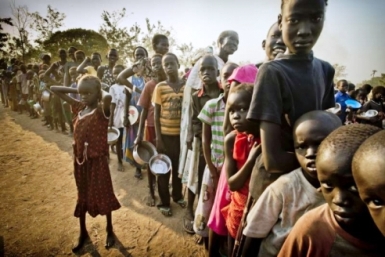South Sudan at risk of famine within five months: UNMISS
March 30, 2014 (JUBA) – A shortfall in humanitarian funding could see South Sudan slide into famine within five months, the head of the UN mission in the country (UNMISS) has warned.

“Famine as it is being defined is likely within five months unless humanitarians … get all the food they need into respective locations before the rains start,” said Johnson. “The clock is ticking and it’s a race against time.”
Of the $1.27 billion needed to address humanitarian needs in South Sudan by June, just 25% has been funded so far, with the large gaps affecting priority sectors such as civilian protection, as well as water, sanitation and hygiene.
Johnson said providing force protection to humanitarian agencies delivering assistance is now among the key priorities of the mission, with insecurity and lawlessness in many parts hindering access to some areas.
The conflict in South Sudan has left nearly 5 million people in need of humanitarian assistance, including 3.7 million at high risk of food insecurity, the UN says.
Johnson’s comments followed calls by John Ging, the operations manager for the Office for the Coordination of Humanitarian Affairs (OCHA), for a greater international response to address the crisis in South Sudan.
Speaking at a press briefing in New York last Tuesday after returning from a recent visit to the region, Ging described the scale of death and destruction in the world’s newest nation, where political tensions erupted in violence in mid-December last year, as “appalling”.
JOINT OPERATION
Last week, UN agencies and their partners launched a joint operation to deliver food and other relief supplies to some of the most isolated areas of conflict-affected South Sudan.
Jonglei state’s Akobo was the first of 14 locations to be targeted by the operation, with the UN Children’s Fund (UNICEF) and the World Food Programme (WFP) using air drops to assist more than 30,000 people near the Ethiopian border.
Agencies are aiming to reach as many as 250,000 people in remote communities in Jonglei, Upper Nile and Unity states over the next month.
“With the rainy season looming we have to seize every opportunity to rapidly deploy teams and life-saving supplies to the hardest to reach. This is how we will avert a humanitarian catastrophe,” UNICEF’s representative in the country, Jonathan Veitch, said.
WFP says looting and ongoing violence are posing enormous challenges to relief operations, with the crisis also impacting on food security in parts of the country not directly affected by fighting due to the disruption to trade routes and food markets.
“The conflict … is pushing millions of people further into hunger and complicating efforts to provide relief, and we are enormously concerned that things could get worse,” said WFP country director Chris Nikoi.
“We have to act quickly to avert an even worse crisis as the rainy season approaches. The mobile response teams are a swift and flexible approach we have been using to reach as many people as we can with assistance in a tremendously challenging environment,” he added.
CHILDREN SUFFERING
Meanwhile, UNICEF has warned that children and families continued to bear the brunt of the conflict and were now facing “unprecedented suffering” amid escalating levels of malnutrition and disease outbreaks.
The conflict has severely disrupted schooling, with many young people being separated from their families or recruited by armed groups.
Over one million people have been displaced since fighting broke out between forces loyal to the government and rebel fighters aligned with former vice-president Riek Machar, including more than 250,000 people who have fled to neighbouring countries.
The UN refugee agency (UNHCR) says South Sudanese continue to flee at a rate of nearly 2,000 per day, the majority of whom are women, children and the elderly.
(ST)
